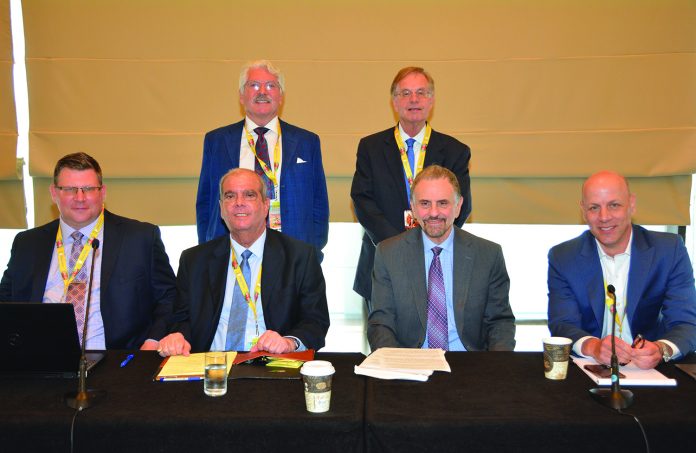(Note: This story appears in the July 2021 issue of ED Magazine)
As the gentlemen’s club industry shakes off COVID rust, clubs themselves have to be ready to face a legal, political and social landscape that has continued to change. In part one of our EXPO legal panel coverage, moderator Larry Kaplan shares some of the comments from panelist attorneys Luke Lirot, Jeffrey Kimmel and Dan Aaronson.
The past year-plus has been an unprecedented time for adult nightclub operators thanks to the combination of a COVID-19-altered reality, a new
administration in Washington, a very different U.S. Supreme Court, and devastating image lawsuits. The EXPO 2021 Legal Panel featured five top industry attorneys who explored challenges operators can expect today and how to ensure they’re up for these tests.
In part one of this two-part report, attorney Luke Lirot discusses model’s image suits, Jeffrey Kimmel tackles industry expectations of the Biden administration. Finally, Daniel Aaronson provides tips for dealing with COVID-19 rage.
Moderator Larry Kaplan noted the industry’s experiencing its most uncertain time ever with nightclubs more challenged by COVID-19 restrictions than other industries with lengthy closures, impossible reopening restrictions, and entertainers and staff now scattered to the winds.
Luke Lirot has represented well over 2,000 First Amendment defendants, many of those adult business- related. Lirot explained the glut of lawsuits for unlicensed model’s image usage on advertising, marketing, and social media. Lirot noted clubs have long used presumably allowable images from web searches or stock photo agencies on their pages. Unfortunately, even if a club pays for images, adult business usage is often prohibited without a model release. Private entities and aggressive law firms have utilized image tracking software, making it easy to uncover countless images on adult pages and facilitate a storm of image suits. Most model suits claim using a model’s image suggests
she performs at or endorses the club, triggering the Federal Lanham act. For the most part, courts have agreed that if you make a living off your face, that’s your trademark, and the Lanham Act applies. Other cases claim misappropriation of their likeness.

Some models have filed multiple lawsuits against literally hundreds of clubs. While some courts have considered how little models were paid for photoshoots and made commensurate awards, many others have awarded $10,000- 20,000 and others as much as $65,000-100,000 or more, frequently related to language in the posts, plus potentially substantial litigation costs. Lirot has often succeeded in achieving much smaller awards than those demanded in the suits.
How to avoid these costly suits? Lirot explains, “If you put anybody’s face on your page, you better have a model release, signed by that person whose image you portray.”
Jeffrey Kimmel is a noted New York-based employment lawyer and litigator who has long represented adult nightclubs. Kimmel detailed what the adult industry can expect from the Biden administration. Kimmel noted it would be the most pro-labor, pro-union administration in years, attempting to legislate stronger worker protections and escalate labor and other executive agency enforcements.
The administration supports the passage of legislation, including the PRO Act, which would empower unions in “right to work” states and impose the Dynamex ABC test as a federal standard for determining independent contractor status. Dynamex was codified as California AB5 and has had a dizzying, sea-change effect on the state’s adult nightclubs and many other businesses reliant on independent contractor occupations.
The PRO Act would also prohibit businesses from requiring agreements with workers that include a class-waiver, which allow claims over disputes individually but not for class.
While the proposed BE HEARD Act’s admirable goal is tackling workplace sexual harassment, it would also phase out the tip-credit, requiring businesses in tip-credit states to pay tipped workers a full minimum wage. In addition, the act includes independent contractors in its protections, allowing them and employees to sue for sexual harassment and making such suits easier to file. It would also prohibit arbitration provisions in employment agreements.
Lirot explained the glut of lawsuits for unlicensed model’s image usage on advertising, marketing, and social media. How to avoid these costly suits? Lirot explains, “If you put anybody’s face on your page, you better have a model release, signed by that person whose image you portray.”
Kimmel detailed the proposed Paycheck Fairness Act, which among other things, would prohibit employers from asking prospective employees their previous earnings.
In addition to pro-worker legislation is a proposed increased hourly minimum wage of as much as $15. While there’s significant pushback, a compromise of $10 over three to five years, and then timing increases to the cost-of-living index is being floated.
Kimmel says the measures won’t easily pass in the current legislature, though parts of them might survive in compromise bills. President Biden said that he strongly supports increases, so businesses need to be prepared.
Ft. Lauderdale-based attorney Daniel Aaronson has represented adult nightclubs and other First Amendment clients nationally and has tackled high-profile criminal cases since 1984. Aaronson provided tips for dealing with legal landmines from customers with pent-up frustrations, detailing how to avoid nuisance actions and potential shutdowns, minimize calls-for-service, lessen adverse secondary effects, and prevent civil suits and criminal charges.
Aaronson explained customers are celebrating COVID-19 victory after long-forced lockups. Homebound, doing nothing with pent-up frustration, they’ve lost socialization skills with some drinking excessively.
“They run into your dancers, fresh from forcibly spending 24/7 with their families, haven’t worked, and don’t have money,” explained Aaronson. “Add club security people who haven’t worked, and you have the perfect storm: people with money wanting to party and celebrate; dancers desperate for money. As a result, fights break out between entertainers over customers and customers over entertainers.”
A club Aaronson represents recently escorted a customer out. The customer returned and shot up the place. Aaronson stressed increased vigilance now and considering upfront whether to call the police if incidents happen, which could increase your calls for service and put squad-cars in your lot. But if you don’t call and have a shooting or brawl, what then?
“Your club must work as a team. Girls shouldn’t fight over customers. Security needs to tone everything down. Prevent defending against a nuisance abatement ordinance or civil suit. Diffuse, diffuse, diffuse.” — Aaronson
“The bottom line is, first diffuse situations; calm people down,” said Aaronson. “Take someone who’s been beaten by another customer aside and ask whether they want to call the police? Then, without obstructing justice, explain the ramifications. Life will go on, they’ll wake up bruised, but it’s not worth multiple court appearances.
“If the police get involved, cooperate fully. You want the police on your side, saying you cooperated. Have your security take the names and numbers of those involved in the altercation. Explain to your dancers that you’ll have guys celebrating who’ll be overly touchy.
“Your club must work as a team. Girls shouldn’t fight over customers. Security needs to tone everything down. Prevent defending against a nuisance abatement ordinance or civil suit. Diffuse, diffuse, diffuse.
“You don’t want us when you don’t need us,” said Aaronson. “We’re damn good at what we do when you need us. Don’t cause yourself to need us more than you must. We’ll be there; we’ll help you when necessary. But first, help yourself, tone down the situation from this combustible mix of alcohol, money, and people wanting.”
In part two of this two-part Legal Panel report, attorney J. Michael Murray discusses the Supreme Court’s altered composition since it last addressed nude dancing in 2000, how that change will affect First Amendment law and ways adult businesses can protect themselves from litigating cases that might end up before an unfriendly new court. Attorney Matt Hoffer explains what government aid is available now to get adult clubs going again.
Larry Kaplan has for 21 years been the Legal Correspondent for ED Magazine. Mr. Kaplan is a broker in the sale and purchase of adult nightclubs and adult retail stores and the founder and Executive Director of the ACE of Michigan adult nightclub state trade association.
Contact attorney Luke Lirot at 813-758-8801 or email luke2@ lirotlaw.com. Contact Jeffrey Kimmel at 212-259-6435 or email jeffrey.kimmel@akerman.com. Contact Daniel Aaronson at 954- 779-1700 or email danaaron@bellsouth.net.





























